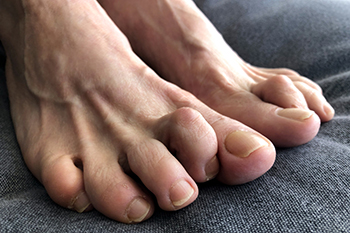

The toes significantly contribute to maintaining balance in the body, in addition to how we walk, stand, and run. The foot condition known as hammertoe is a deformity that causes the second and third toes to bend downward at the middle joint, often resembling a hammer. Hammertoes can cause corns to develop on top of the affected toes due to them constantly rubbing against the top of the shoe. Hammertoes are often caused by the type of shoes that are worn, which generally do not have adequate room for the toes to move freely in. This can affect the muscles in the toes and the toes may be unable to stretch and flex normally. The symptoms gradually occur, and the patient may not notice until the joints become stiff. Existing medical conditions like arthritis, bunions, or abnormal arches may increase the risk of hammertoe. Patients can find mild relief when specific stretches are performed that include the toes as well as protective pads on top of the toes. If you have this condition, it is suggested that you are under the care of a podiatrist who can offer you effective treatment options.
Hammertoe
Hammertoes can be a painful condition to live with. For more information, contact Dr. Todd Goldberg from Complete Family Foot Care Center. Our doctor will answer any of your foot- and ankle-related questions.
Hammertoe is a foot deformity that affects the joints of the second, third, fourth, or fifth toes of your feet. It is a painful foot condition in which these toes curl and arch up, which can often lead to pain when wearing footwear.
Symptoms
Causes
Genetics – People who are genetically predisposed to hammertoe are often more susceptible
Arthritis – Because arthritis affects the joints in your toes, further deformities stemming from arthritis can occur
Trauma – Direct trauma to the toes could potentially lead to hammertoe
Ill-fitting shoes – Undue pressure on the front of the toes from ill-fitting shoes can potentially lead to the development of hammertoe
Treatment
Orthotics – Custom made inserts can be used to help relieve pressure placed on the toes and therefore relieve some of the pain associated with it
Medications – Oral medications such as anti-inflammatories or NSAIDs could be used to treat the pain and inflammation hammertoes causes. Injections of corticosteroids are also sometimes used
Surgery – In more severe cases where the hammertoes have become more rigid, foot surgery is a potential option
If you have any questions please contact our office located in Littlestown, PA . We offer the newest diagnostic and treatment technologies for all your foot and ankle needs.